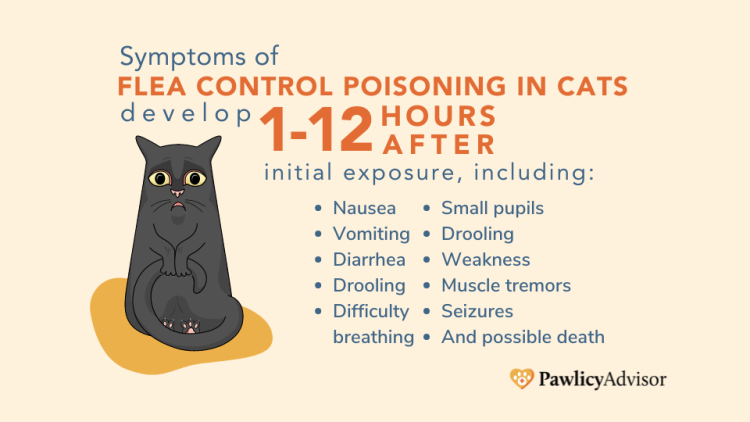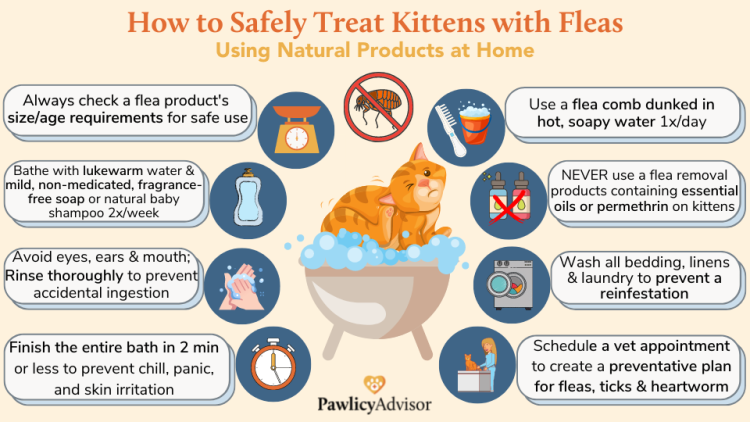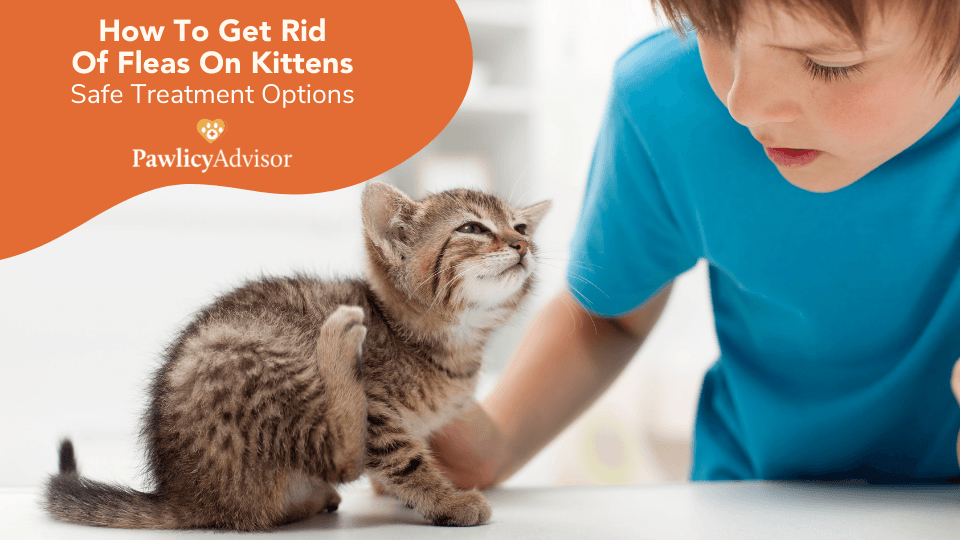Kittens with fleas should be taken seriously and treated immediately. If left untreated, these external parasites can cause discomfort, infestation, skin issues, and disease in both felines and humans. Fleas on cats are relatively easy to get rid of, but flea control for kittens can be tricky since the active ingredients found in many commercial products are unsafe for young cats.
Protect Your Kitten with Cat Insurance Get the New Kitten Checklist
Below, we discuss the risks of flea control product toxicity and the best natural treatments for kittens fleas that you can do from home. You’ll also learn tips on safely how to get rid of fleas on kittens safely and prevent an infestation from recurring.
Click on a link to learn more:
- What are the risks of flea treatments for kittens?
- What flea treatments are safe for kittens?
- How to safely treat fleas on kittens
- What’s the best kitten flea treatment?
- When can you start flea treatment on kittens?
- How to get a prescription for kitten flea treatment
- Key Takeaways
- Frequently Asked Questions
What are the risks of flea treatments for kittens?
Flea treatments can quickly induce poisoning in kittens if too much product or the wrong product is used. The symptoms of flea control product toxicity in kittens can appear anywhere from one to 12 hours after administration and varies depending on the ingredients and dosage the cat is exposed to.
Flea solutions containing organophosphate, a group of chemicals often used as insecticides in gardening products, can be life-threatening to kittens. Symptoms of toxicity may include:
- Vomiting
- Diarrhea
- Weakness
- Small pupils
- Difficulty breathing
- Drooling
- Muscle tremors
Permethrin, a chemical found in canine flea treatments, is also very toxic to cats and potentially lethal in kittens. Prevalent symptoms of toxicity include:
- Excessive salivation
- Twitching
- Seizures
If you notice the clinical signs of toxicity, put your kitten in a bath of lukewarm water and wash the product off using a gentle dish soap like Dawn, then call your veterinarian or local animal hospital for further instructions.

What flea treatments are safe for kittens?
Safe flea treatments for kittens are available over-the-counter (OTC) and by prescription from your veterinarian. Depending on the age and weight of your cat, some options may include:
- Natural remedies
- Commercial products
- Prescription medications
How to safely treat fleas on kittens
While you should always consult your veterinarian for advice on how to remove kitten fleas safely, here are a few tips to keep in mind:
Read the product label for approved usage
Most, but not all, commercial flea treatments are suitable for kittens at least 8 weeks old or 1.5 to 2 pounds in weight. Flea products aren't usually tested on younger or smaller cats, so they could potentially contain levels of active ingredients that are too strong for kittens. However, some flea treatments on the market are safe for kittens as young as 4 weeks old.
Your vet can assist you in finding flea-removal products for your kitten specific to their age and size. Again, reading the label before administering a store-bought solution is essential because although a flea product may be safe for adult cats, it’s not necessarily safe for young kittens.
Stay away from products containing permethrin
Cats have a poor ability to process permethrin. Although safe for canines, permethrin is extremely dangerous and potentially toxic to cats. When purchasing an OTC flea solution for kittens, always confirm it does not include permethrin, and never use a product you might already have at home on your cat if its intended usage is for a dog.
Try natural flea removal methods
To avoid the risk of accidental poisoning in kittens due to a flea control product, try to get rid of kitten fleas naturally with a warm, soapy bath. Here are some tips you can follow to safely treat kitten fleas at home:
- Bath them in lukewarm water with mild soap no more than twice a week (bathing more frequently can damage your pet’s skin).
- Use gentle, nonmedicated, fragrance-free soap or a natural baby shampoo. Consult your veterinarian beforehand if your kitten’s skin appears sensitive or contains open wounds.
- Wash from the head down, avoiding the eyes, ears, and mouth.
- Be sure rinse thoroughly to prevent them from ingesting any soap residue later on while grooming.
- Try to complete the bath within 2 minutes to prevent your kitten from getting chilled or panicked during the bath.
You can also use a flea comb dunked in hot, soapy water once or twice a day to prevent skin irritation.
It should be noted that these natural flea removal methods will only help you get rid of adult fleas and will not prevent new fleas from infesting your kitten. These approaches won’t solve the problem long term, but they are safe for kittens who are too young or too small to utilize commercial flea products.
Don’t use essential oils
Similar to permethrin, some types of essential oils (such as citrus, pine, ylang-ylang, peppermint, and cinnamon oil) can be hazardous to felines, even in small doses. Many natural flea medicines contain essential oils because they are effective against fleas but it’s best to avoid usage altogether, especially while your feline friend is still young.

What’s the best kitten flea treatment?
For kittens under eight weeks of age, the safest option is to use a flea comb dunked in hot, soapy water once or twice a day.
For older kittens, flea control is available over-the-counter and by prescription. Some of the most popular options include:
- Capstar, which is available without a prescription and is the only flea product safe for kittens as young as 4 weeks and weighing at least 2 pounds. The active ingredient is effective for 24 hours.
- Frontline Plus, also available without a prescription. It kills flea eggs, adult fleas, and flea larvae, in addition to ticks and chewing lice. It’s safe for use in kittens 8 weeks old weighing at least 1.5 pounds.
- Advantage, safe for kittens 8 weeks old weighing at least 2 pounds, is also available without a prescription but does not kill ticks.
Keep in mind, the active ingredients in OTC kitten flea treatments is not as reliable nor successful as prescription medications. Consult your vet before selecting a flea treatment brand for your kitten. Your vet can advise you on the best option based on your feline's lifestyle, temperament, and the parasites common in your area.
When can you start flea treatment on kittens?
Kittens can safely receive topical flea treatments after they are 8-10 weeks old and weigh more than 1.5-2 lb. These medicines will not only eliminate the existing fleas, but they will also prevent new fleas from infesting your pet.
An effective flea prevention product will help avoid re-infestation, and washing your kitten’s bedding frequently in hot water will help kill any flea eggs. Your veterinarian will be able to prescribe the best flea prevention product.
How to get a prescription for kitten flea treatment
To get a prescription for kitten flea treatment, make an appointment with your veterinarian. There are a number of medications that can help you get rid of fleas on kittens and prevent them from recurring.
Learn How Pet Insurance Can Help Pay Vet Bills Is Pet Insurance Worth It?
Key Takeaways
- Fleas on cats and dogs require a swift response to prevent secondary health problems and a home infestation that affects humans and pets, but treating fleas on kittens presents potential hazards.
- Most OTC flea treatments are only safe for use on kittens at least 8 weeks old weight over 1.5 - 2 pounds.
- Prevention is always better than treatment when it comes to kitten fleas, so be sure that your kitten and all household pets are regularly using preventative therapies as part of their routine care.
Frequently Asked Questions
Do indoor kittens need flea treatment?
Yes. Every feline, including indoor cats and kittens, needs a for flea control product.
What are the side effects of flea treatment in kittens?
If used inappropriately, many flea eradication products might cause toxicity and other health issues in cats. The most common symptoms include diarrhea, vomiting, skin redness or irritation, or even tremors and seizures.
What’s the best natural flea treatment for kittens?
A gentle bath with dish soap or baby shampoo will help wash away the larva and flea dirt and kill the live fleas.
How much does flea treatment cost for kittens?
Kitten flea treatment products cost about $50 for a 3-month supply on average.
Does pet insurance cover the cost of kitten flea treatment?
Because flea treatment is often considered a preventative condition, most companies that offer pet insurance for cats won’t cover it under their basic accident and illness plans. Some insurers, however, have pet wellness plans that cover all or part of the expense of flea treatment.
